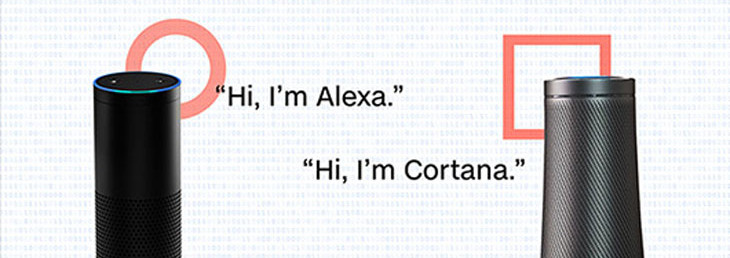Bezos and Nadella talked and now Alexa and Cortana can do it too

Important companies are betting big on AI making voice the dominant user interface of the future. Consumers are increasingly adopting speaker-based voice assistants. As of 2017, the capabilities and usage of these software programs that respond to voice commands in order to perform a range of tasks are expanding rapidly. Shipments of Google Home and Amazon Echo speakers are expected to climb more than threefold to 24.5 million during this year.
However, major hurdles exist that need to be overcome before intelligent voice assistants will see mass adoption. Surely, one of the most annoying is that they don’t work across platforms. A voice assistant can be used to find an opening in a consumer’s calendar to schedule an appointment, check the weather, play music or even texting, acting as a hand-free facilitator to those and many other tasks. An average user may have Amazon Echo at home, carry an iPhone in his pocket all day and work with Microsoft Office for all productivity software at his PC, but the assistants that come with each device don’t talk to each other.
To whom or what each device is able to talk with is not a trivial question. Stakes in the competition for dominance in the voice assistant market are high. More popular platforms will have a substantial advantage, and gaining this popularity will have as one of its main drivers the capacity for each competing assistant to become interconnected with the bigger ecosystem possible of devices that it can control.
It’s about ecosystems, again
This is not the first time we write about creating ecosystems as an imperative business need, especially in many new markets with a huge future potential waiting for more collaboration to facilitate those ecosystems, as is the case of the Internet of the Things or Industry 4.0. The opposite are companies focusing on building their own platforms and invested in keeping users on those instead of collaborating with competitors to make easier to integrate multiple platforms.
The same case can be applied to Voice Assistants. This is why it is worth to pay attention to the recent announcement of Amazon and Microsoft about their assistants Alexa and Cortana being soon able to communicate. Both companies agreed to integrate their products and expand the relative capabilities of each. The idea is, of course, to help break down barriers between the two ecosystems, allowing users to access more information and features even if it’s on different platforms. The integration is expected to roll out by the end of 2017.
Amazon CEO Jeff Bezos explained how this collaboration will sum up the win-win benefits they see for their respective users by letting their voice assistants interoperate: “Alexa customers will be able to access Cortana’s unique features like booking a meeting or accessing work calendars, reminding you to pick up flowers on your way home, or reading your work email – all using just your voice. Similarly, Cortana customers can ask Alexa to control their smart home devices, shop on Amazon.com, interact with many of the more than 20,000 skills built by third-party developers, and much more.”
A collaboration that makes business sense
As in so many other cases, collaboration is more likely to work and success when it makes good business sense. In the battle for domination of voice assistants among the tech giants, Microsoft’s Cortana has always seemed furthest behind. On the other hand, Amazon is the only one of the major platforms that doesn’t have its own operating system. Unlike Google and Apple, neither Microsoft nor Amazon has a robust mobile presence. Alexa and Cortana play in very different markets; the first one being ecommerce/entertainment and consumer focused, the second one based on productivity and business user focused. That means there are no barriers to defend their respective territories from each other.
At the contrary, introducing a bridge between those two platforms could help strengthen both, making up for each other’s weaknesses and providing customers with a richer and more helpful experience. Besides, the partnership gives Microsoft access to Amazon’s lead in the early smart speaker market and to the more consumer-centric capabilities of Alexa, such controlling various smart home gadgets. On the other hand, Alexa can improve it chances of leaving homes and having more efficient uses in an office and other business environments. Both companies, Amazon and Microsoft, are cutting deals with carmakers to integrate their assistants directly into vehicles. Both assistants becoming part of a bigger interconnected ecosystems may leverage a better selling point for this new potential market.
This agreement may potentially shake up the digital assistant market. Jeff Bezos has stated he envisions that users will make a request and whichever AI is better equipped will answer it. But most analyst consider unlikely Apple or Google getting interested on the interoperability with other assistants. None of these two market leaders has been approached about bringing their assistants to a similar deal. Maybe the Microsoft-Amazon partnership puts the most pressure on Google, which has a current size advantage thanks to its assistant coming on Android phones. The Cortana integration gives Alexa access to around 500 million Windows 10 PCs, which could be considered making Google’s size advantage smaller, thus making this one another case of a collaboration between two minor players to fight against players on a better position in a particular market.
It’s worth noting that this unusual partnership, as in many other cases of such collaboration projects, began with a conversation between the two main leaders of the companies involved when Mr. Bezos raised the idea with Mr. Nadella at Microsoft’s CEO Summit, an annual event for business leaders in the Seattle.
